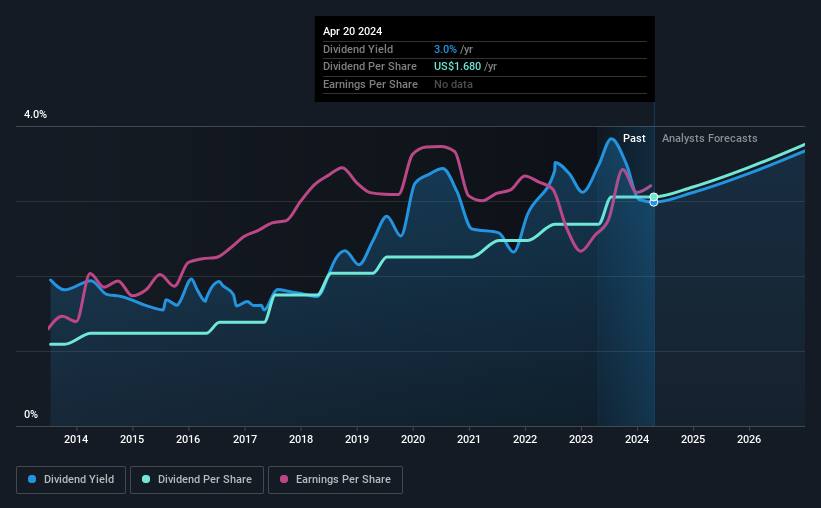Stock Analysis
- United States
- /
- Capital Markets
- /
- NYSE:BK
Be Sure To Check Out The Bank of New York Mellon Corporation (NYSE:BK) Before It Goes Ex-Dividend

It looks like The Bank of New York Mellon Corporation (NYSE:BK) is about to go ex-dividend in the next 4 days. The ex-dividend date is one business day before a company's record date, which is the date on which the company determines which shareholders are entitled to receive a dividend. The ex-dividend date is important as the process of settlement involves two full business days. So if you miss that date, you would not show up on the company's books on the record date. Therefore, if you purchase Bank of New York Mellon's shares on or after the 25th of April, you won't be eligible to receive the dividend, when it is paid on the 9th of May.
The company's next dividend payment will be US$0.42 per share, on the back of last year when the company paid a total of US$1.68 to shareholders. Last year's total dividend payments show that Bank of New York Mellon has a trailing yield of 3.0% on the current share price of US$56.29. We love seeing companies pay a dividend, but it's also important to be sure that laying the golden eggs isn't going to kill our golden goose! That's why we should always check whether the dividend payments appear sustainable, and if the company is growing.
View our latest analysis for Bank of New York Mellon
Dividends are typically paid from company earnings. If a company pays more in dividends than it earned in profit, then the dividend could be unsustainable. Fortunately Bank of New York Mellon's payout ratio is modest, at just 41% of profit.
Generally speaking, the lower a company's payout ratios, the more resilient its dividend usually is.
Click here to see the company's payout ratio, plus analyst estimates of its future dividends.

Have Earnings And Dividends Been Growing?
Companies that aren't growing their earnings can still be valuable, but it is even more important to assess the sustainability of the dividend if it looks like the company will struggle to grow. If earnings decline and the company is forced to cut its dividend, investors could watch the value of their investment go up in smoke. That explains why we're not overly excited about Bank of New York Mellon's flat earnings over the past five years. We'd take that over an earnings decline any day, but in the long run, the best dividend stocks all grow their earnings per share.
Many investors will assess a company's dividend performance by evaluating how much the dividend payments have changed over time. In the last 10 years, Bank of New York Mellon has lifted its dividend by approximately 11% a year on average.
Final Takeaway
Is Bank of New York Mellon an attractive dividend stock, or better left on the shelf? Earnings per share have been flat in recent years, although Bank of New York Mellon reinvests more than half its earnings in the business, which could suggest there are some growth projects that have not yet reached fruition. Overall, Bank of New York Mellon looks like a promising dividend stock in this analysis, and we think it would be worth investigating further.
Curious what other investors think of Bank of New York Mellon? See what analysts are forecasting, with this visualisation of its historical and future estimated earnings and cash flow.
A common investing mistake is buying the first interesting stock you see. Here you can find a full list of high-yield dividend stocks.
Valuation is complex, but we're helping make it simple.
Find out whether Bank of New York Mellon is potentially over or undervalued by checking out our comprehensive analysis, which includes fair value estimates, risks and warnings, dividends, insider transactions and financial health.
View the Free AnalysisHave feedback on this article? Concerned about the content? Get in touch with us directly. Alternatively, email editorial-team (at) simplywallst.com.
This article by Simply Wall St is general in nature. We provide commentary based on historical data and analyst forecasts only using an unbiased methodology and our articles are not intended to be financial advice. It does not constitute a recommendation to buy or sell any stock, and does not take account of your objectives, or your financial situation. We aim to bring you long-term focused analysis driven by fundamental data. Note that our analysis may not factor in the latest price-sensitive company announcements or qualitative material. Simply Wall St has no position in any stocks mentioned.
About NYSE:BK
Bank of New York Mellon
The Bank of New York Mellon Corporation provides a range of financial products and services in the United States and internationally.
Flawless balance sheet established dividend payer.

